I’m still not convinced.
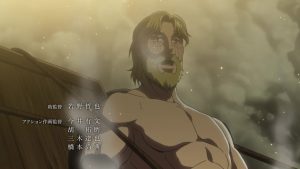 Say what you will, I haven’t looked forward to an ep of Shingeki no Kyoujin so much in… ever? So that has to count for something, I guess. It may not have played out exactly the way I would have liked, and it may have been rather clumsy and overwrought in the final moment, but the bottom line is this: Erwin is dead. Praise be to Jeebus, our long nightmare is finally over. And I’m willing to overlook a lot of stick when that’s the carrot.
Say what you will, I haven’t looked forward to an ep of Shingeki no Kyoujin so much in… ever? So that has to count for something, I guess. It may not have played out exactly the way I would have liked, and it may have been rather clumsy and overwrought in the final moment, but the bottom line is this: Erwin is dead. Praise be to Jeebus, our long nightmare is finally over. And I’m willing to overlook a lot of stick when that’s the carrot.
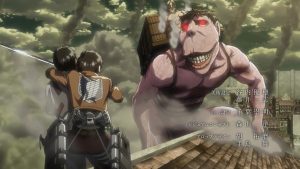 I almost can’t believe it – I no longer have to have WHY WON’T YOU DIE in my blogging vocabulary (for this show, anyway). And that disbelief scares me a little, because I was worried right up until the end that Isayama would find a way to make Erwin linger like a fart in an elevator. Not by letting Armin die – somehow, I just never felt like that was a realistic possibility. No, what scared me a little was the prospect of an Isayama asspull that would have both of them survive, somehow. And TBH I’m still scared about that a little – I’m going to see that irritating face in every shadow on AoT, at least for a while. Sure he’s dead – but will he stay dead? Is that too much to ask for?
I almost can’t believe it – I no longer have to have WHY WON’T YOU DIE in my blogging vocabulary (for this show, anyway). And that disbelief scares me a little, because I was worried right up until the end that Isayama would find a way to make Erwin linger like a fart in an elevator. Not by letting Armin die – somehow, I just never felt like that was a realistic possibility. No, what scared me a little was the prospect of an Isayama asspull that would have both of them survive, somehow. And TBH I’m still scared about that a little – I’m going to see that irritating face in every shadow on AoT, at least for a while. Sure he’s dead – but will he stay dead? Is that too much to ask for?
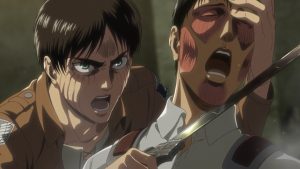 Given how badly I wanted to see Erwin die (and Armin live too, of course, though like I said I just didn’t sweat that too much) it’s hard to say whether this episode was really good or I was just tense while watching it. The fact remains that the whole reason this exchange is taking place is still very much an unresolved factor, and we do get a few additional tidbits related to that. Like the Beastmaster telling Eren (who he recognized) that both of them were victims of Grisha Jaeger – that they’d been “brainwashed”. This was right before he rescued Reiner right out from under Hange’s nose – and he was only still around because Jean shamed Hange into not killing him until they were sure he couldn’t be useful as the main dish in the injection project.
Given how badly I wanted to see Erwin die (and Armin live too, of course, though like I said I just didn’t sweat that too much) it’s hard to say whether this episode was really good or I was just tense while watching it. The fact remains that the whole reason this exchange is taking place is still very much an unresolved factor, and we do get a few additional tidbits related to that. Like the Beastmaster telling Eren (who he recognized) that both of them were victims of Grisha Jaeger – that they’d been “brainwashed”. This was right before he rescued Reiner right out from under Hange’s nose – and he was only still around because Jean shamed Hange into not killing him until they were sure he couldn’t be useful as the main dish in the injection project.
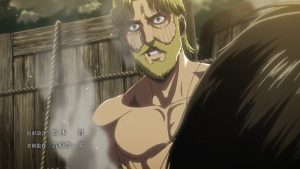 I did almost throw up a few times when Levi (and then Hange) were waxing endlessly about how essential Erwin was – how his “talent” was essential to saving humanity. Frankly I think Eren and Mikasa gave up a little too easy (and I was ready to throttle the weasel from Erwin’s suicide squad). Of course Eren was right – it’d actually been Armin coming up with the good ideas at every turn, saving the day time after time – often after having been forced to by Erwin’s blundering. What Levi and Hange wanted to do was personal, no more and no less – they were prioritizing their friend over Eren and Mikasa’s. Fuck that – the only way Eren and Mikasa should have left that rooftop was kicking, screaming and biting every step of the way.
I did almost throw up a few times when Levi (and then Hange) were waxing endlessly about how essential Erwin was – how his “talent” was essential to saving humanity. Frankly I think Eren and Mikasa gave up a little too easy (and I was ready to throttle the weasel from Erwin’s suicide squad). Of course Eren was right – it’d actually been Armin coming up with the good ideas at every turn, saving the day time after time – often after having been forced to by Erwin’s blundering. What Levi and Hange wanted to do was personal, no more and no less – they were prioritizing their friend over Eren and Mikasa’s. Fuck that – the only way Eren and Mikasa should have left that rooftop was kicking, screaming and biting every step of the way.
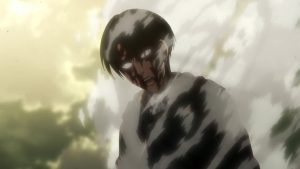 I suppose the question here is this – did Erwin consciously pull his arm away? Did he have awareness of what Levi was about to do? It would be just like Isayama to give the guy who least deserves it a heroic death, but I choose to believe Erwin was incoherent and Levi did what he did because he’d seen Buffy the Vampire Slayer. But whatever the reason Levi did it, he did it – he chose the future over his own loyalties. And like I said, if – if – Erwin really is dead, in the end I’m not going to quibble that much about the details.
I suppose the question here is this – did Erwin consciously pull his arm away? Did he have awareness of what Levi was about to do? It would be just like Isayama to give the guy who least deserves it a heroic death, but I choose to believe Erwin was incoherent and Levi did what he did because he’d seen Buffy the Vampire Slayer. But whatever the reason Levi did it, he did it – he chose the future over his own loyalties. And like I said, if – if – Erwin really is dead, in the end I’m not going to quibble that much about the details.
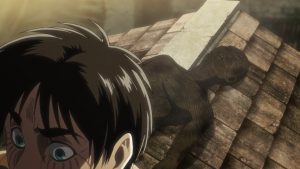 That leaves us to deal with the basement – and of course Armin Mark II. I can’t imagine he’s going to be happy when he finds out he popped Bertholdt’s head like he was Denethor and it was a cherry tomato, but it’s not like anyone had a choice in the matter. Armin being a titan – much less the Colossal Titan (assuming this all works) – certainly adds a dimension to the story. Armin is easily the most introspective and self-aware person in the main cast – seeing him deal with the reality of being a titan has the potential to be way more interesting than it has been with Eren.
That leaves us to deal with the basement – and of course Armin Mark II. I can’t imagine he’s going to be happy when he finds out he popped Bertholdt’s head like he was Denethor and it was a cherry tomato, but it’s not like anyone had a choice in the matter. Armin being a titan – much less the Colossal Titan (assuming this all works) – certainly adds a dimension to the story. Armin is easily the most introspective and self-aware person in the main cast – seeing him deal with the reality of being a titan has the potential to be way more interesting than it has been with Eren.
Oh, did I mention – HE’S DEAD.


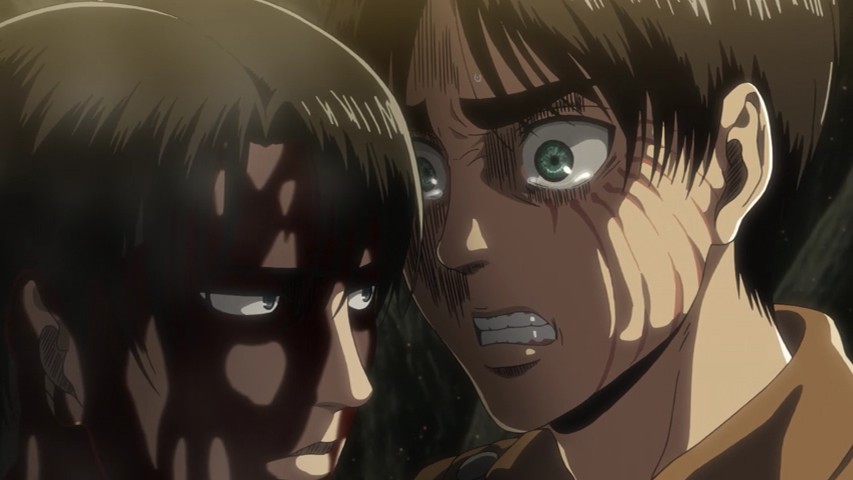
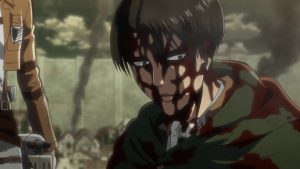
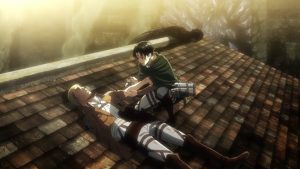






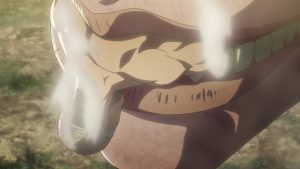
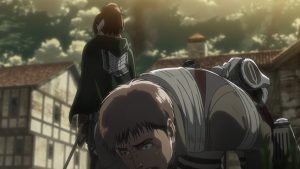



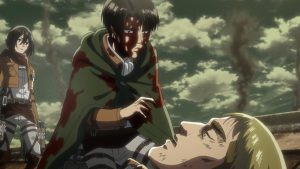

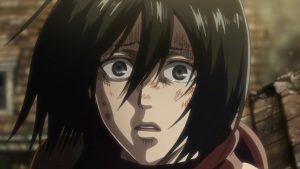

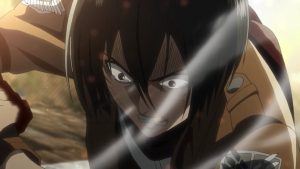
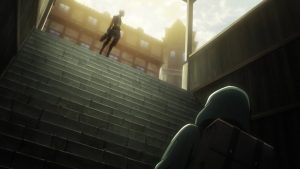
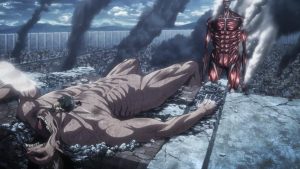


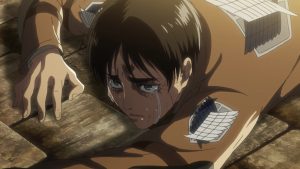

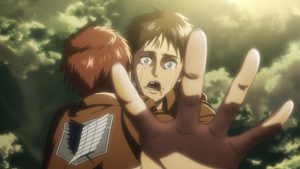
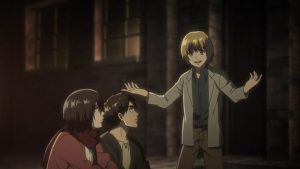
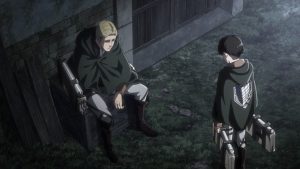

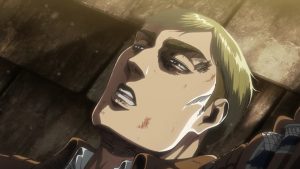

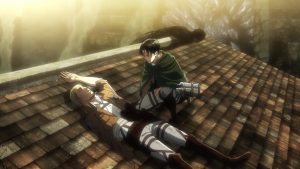
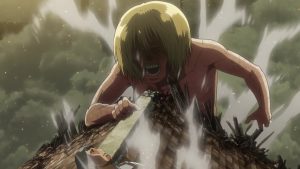

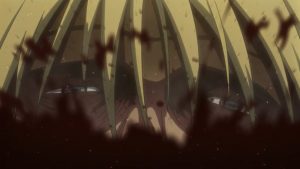
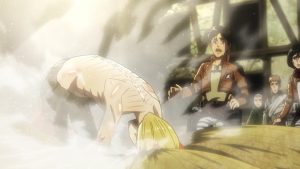

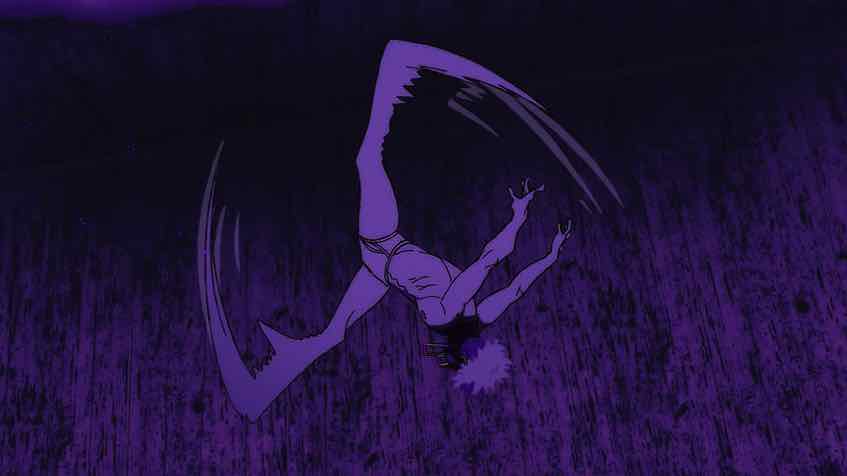
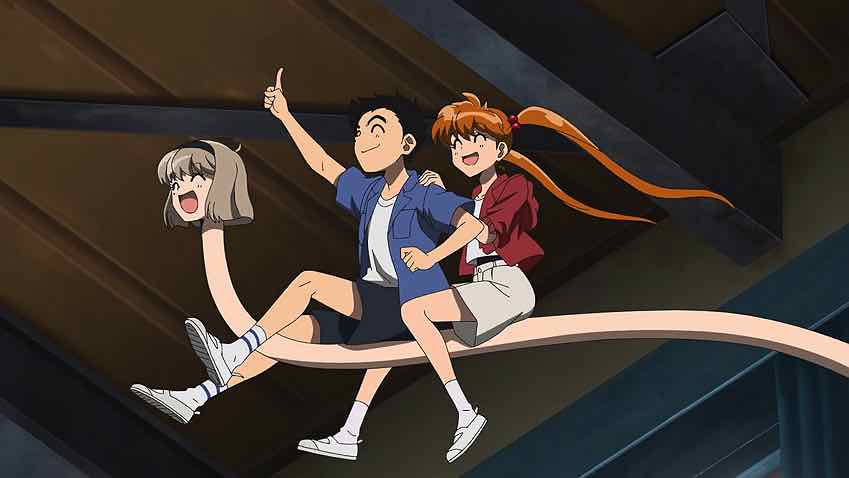
Simone
June 3, 2019 at 8:27 pmOh my God it was SO HARD not to say anything these last weeks XD. Your posts leading up to this moment were an endless source of amusement when combined with manga knowledge. But see, AoT isn’t AS dead set in disappointing you as you feared. Erwin’s arc really was complete anyway, there wasn’t much he could add to the story, and I guess there’s some irony in having him die before getting to see that goddamned basement.
BTW, I would hope next week is finally FUCKING BASEMENT O’CLOCK. The moment 3 seasons in the making.
JJ
June 3, 2019 at 9:14 pmDing, dong, The Witch is dead!
Which old witch? The Wicked Witch!
Levi & Hange’s ramblings were the intellectual equivalent of an elephant on an ice rink, but I’m glad Levi had a brief bout of sanity when it mattered.
Guardian Enzo
June 3, 2019 at 9:36 pmPretty much!
Red butterfly
June 3, 2019 at 11:48 pmErwin was indeed incoherent when he rose his arm before Levi, he was hallucinating and dreaming of the day when he rose his arm in his father’s class to ask the question that would lead his father to death.
Damn,your reviews are so funny, you seem such at a loss. I look forward for the basement and your interpretation.
Bench
June 4, 2019 at 12:54 amLevi’s reasoning at the end is not explicitly verbalized but from my understanding it seems a combo of what Eren and Floch said, wanting Erwin to literally RIP, and Armin’s dream of an ideal beyond the walls greater than Erwins dream of seeking the basement (he was eavesdropiing to the main trios convo of dreams in Ep 49).
Goh
June 4, 2019 at 1:34 amI stupidly thought that people dismissing aot would wake the fuck up after watching this episode. I underestimated how invested some people are in pretending that they are smarter and more sophisticated than this show (don’t worry, noone is).
The assumptions in this thread are so embrassing. Look at the playful tone, set by the blogger and embraced by some the commentariat. Pretending that one of the best anime episodes of all time was mindless bullshit, so that we don’t face up to the fact that we were wrong all along and one of the best stories ever told in this medium slipped right past our ”experienced” sensibilities.
Orion Taylor
June 4, 2019 at 4:08 amHey, I’d be really interested on hearing your thoughts on this article:
https://medium.com/@urbanfriendden/attack-on-titan-horror-aesthetics-and-authoritarianism-e98f7325a893
(The article would have been spoilery a few weeks ago, but we are finally at a point where I can post it here)
I think the above sums up the stance that a lot of people here have w/respect to the text. AoT is definitely a very captivating/entertaining series, and it definitely has a lot to say. However, on a deeper read, its messages are a bit self-contradictory (The most obvious instance of this being the portrayal of death as brutal/painful/inglorious/meaningless but also a completely necessary sacrifice for the survival of humanity, with no viable alternative presented).
I don’t think you’ll agree with the article, in fact I think it’s possible that you’ll vehemently disagree. I’m also not trying to convince you/change your mind. I would be really interested in hearing what you think about it though, and why it is a (un)reasonable interpretation of the text up to this point in the anime.
Goh
June 4, 2019 at 5:28 amFirst of all thank you for the earnest reply. I should start by saying that there are many great authors with fucked up politics. Mishima, Celine, Naipaul or Kipling come to mind. Their personal beliefs show in their work in various (often contradictory) ways but they are great in creating unforgetable images and describing some complicated, unutterable,to most, things. Karl Marx’s favorite author was Balzac, a royalist, because he captured best the realities of french everyday life and class society. Now, the dismissal of these authors because of their personal politics would seem absolutely ridiculous to most.
That’s not to say that what an author believes is immaterial, or cannot diminish a work, especially if it shows awkwardly in the text. I don’t know what Isayama himself believes, but the emotional truth of the series is the very opposite of fascist, if words still have meaning. I should be more specific:
a) The first thing Shingeki does is destroy the Schmittian friend-enemy dichotomy by revealing that Eren, the kid who wants to exterminate every Titan, is himself a Titan. Later on we learn that some of his most trusted comrades are also Titans, who have inflicted great suffering to so many people. But we are never meant to truly hate them. There are no mustache twirlers here and the series never satisfies the audience’s revenge fantasies. People are never represented as bugs to be exterminated and death is always tragic and sad. Look at Berthold’s death on the most recent episode. It would be shockingly insensitive and sociopathic to cheer for his death. We excuse so many series that make revenge or capital punishment seem cool and badass. Yet Shingeki actively strives to cultivate empathy for everyone. Because Isayama understands people, and why some people do awful things. Look at the portrayal of the King’s executioner from the first half of the 3d season. What other anime dares to go there?
b) Isayama also understands death, and especially violent death, something that so many anime get wrong. Look at Mike’s death, Marlowe’s or Bertholdt’s here. Shingeki is so far ahead compared to almost every other series. There are no badass last stands, warriors standing tall and proud, facing impending doom, no heroic dying for the nation. Just pure terror and the audience’s realization that an individual who truly wants to live, will now die horribly. Whatever happens next will not make any difference to them. They are not watching over us from the heavens, they are gone forever, at best someone will remember them.
The author of the article you shared seems to truly believe the series is pro war and pro extermination. I truly cannot understand how someone can look at this scene and still believe that: https://www.youtube.com/watch?v=zdgyTim9sMo&t=
Look at the final thoughts of Marlowe. Do you really think a fascist that believes in ”necessary sacrifice for the greater good” would highligh so convincincly how people feel when they get swallowed up in large causes and their lives destroyed as a result? The author even talks about Shingeki’s absolute morality and makes me truly doubt that he ever watched the series.
Orion Taylor
June 4, 2019 at 8:39 amI agree with both of your points: Shingeki is very successful in getting us to empathize with characters on both sides of the conflict, and in depicting death as neither heroic nor glorious, but rather as excruciatingly painful, and extremely tragic, regardless of whose death it is. I don’t think anyone can conclude from this that war is a good thing: war is clearly awful, and the story acknowledges this. However, I would argue that the narrative suggests that, despite this, people cannot show their enemies mercy or kindness.
AoT presents a very bleak worldview: it’s a dog eat dog world out there, violent conflict is inevitable, and though our enemies may be just like us, there is no option but to defeat them, at any cost, if we wish to survive. Mercy is not presented as a strength born from a strong moral character, but rather as a weakness born from a lack of resolve, a weakness that can be exploited to achieve victory. A few spoiler-free examples:
-Bertholdt was a former comrade, he is just as human as the rest of the main cast, and death by titan is clearly awful. However, he’s an extremely dangerous enemy, and his power is both a strategic asset and Armin’s only salvation. The merciful option would be to let him live for the time being as a prisoner of war, and then bring him to trial so that he can face justice for his war crimes. The pragmatic option is to trade his life for Armin’s by summarily executing him, because former comrade or not, Armin is about to die. Bertholdt’s execution is indeed extremely gruesome and painful to watch, but in the narrative it is justified because the alternative is to just let Armin die.
-Bertholdt’s indecisiveness is ultimately what gets him killed. Armin’s distraction only works because Bertholdt did not immediately act to kill him, but instead is merciful and provides Armin ample time to flee.
-Back in the first half of season 3, Jean hesitates to kill a member of the military police, and is almost killed as a result. He survives the encounter because Armin is a split second faster at pulling the trigger than their opponent, who herself had hesitated. Though they later debate on whether the action is right or wrong, the narrative conclusion is that Armin’s ruthlessness saved Jean, and their opponent’s ruthlessness doomed her to die.
-Annie shows Armin mercy and lets him live during her first encounter with him in titan form. Armin then proves essential to unmasking Annie as the female titan, leading to her capture.
-Reiner’s empathy for his enemies drives him insane, leading to a split personality.
Contrast this with following two classic examples
-Harry Potter: Harry spares Wormtail’s life. Though Wormtail doesn’t deserve the kindness, and escapes as a result, Harry’s life is saved because of this act.
-Lord of the Rings: Gollum is spared by both Frodo and Bilbo, and as a result Sauron is destroyed.
Add to this the fact that many of these gruesome and seemingly pointless deaths end up playing a pivotal role achieving victory/survival for the main characters, and it doesn’t paint a pretty picture.
The things that would help me to draw alternate conclusions would be examples in SnK in which kindness/mercy/empathy is rewarded, examples in which self-sacrifice for the sake of humanity / the nation really does end up proving to be pointless, or instances in which a non-violent/pacifistic approach is presented as a viable alternative to the status quo.
Goh
June 4, 2019 at 9:45 am”Bertholdt’s execution is indeed extremely gruesome and painful to watch, but in the narrative it is justified because the alternative is to just let Armin die.”
Yes, the alternative is to let Armin die. But Isayama doesn’t make it easy, at all. The narrative doesn’t justify anything. It is an understandable decision but profoundly horrible and sad at the same time. The contradiction of crying at Berthold’s death and crying at Armin’s resurrection is the whole human truth of it all and reveals the power of this story.
Marlowe’s death also reveals that even if countless sacrifices can lead up to some revelation or discovery, that fact definitely doesn’t erase the loss and suffering of individuals. Humanity be damned if a person can spend one more day with their best friend in safety. At the same time, it appears completely understandable that people can be swept up by Erwin’s embrace of self-sacrifice. Do you remember the scene in the final episode of last season where he was ecstatically shouting atop the walls? It makes sense that people make the irrational decision to follow him. The series definitely understands that this guy has led lots of people to their deaths, often without a clear goal and without any guarantees. Like Levi said, it also knows why this world produces people like him. Shingeki is less interested in judgment, than in truly understanding why people do what they do and embracing them, no matter their sins (but without making us forget the human cost of what they did either).
Jean’s frustration at letting Reiner go or hesitating to kill that woman doesn’t make him weak, it makes him human and fundamentally a good person. Armin puked after killing that person. Yes he saved his friend, but any other show would leave it at that and make it seem an obiously justified action. Titan nevers lets its characters or its audience off easy. One of the hardest thing Shingeki does is to imbue its dialectical approach to any situation or theme with pure human emotion rather than cold both-sides-ism. It’s a deeply human story and in the end that’s what makes any charge of it being fascist seem not only false and unconvincing, but completely unfair and ridiculous.
Simone
June 4, 2019 at 2:38 pmWell, to be fair, many of those are examples are in a context of combat, and I think the word for Isayama’s perspective there is simply “realism”. It’d be nice to think that there’s a karma or higher power that in the long run rewards acts of mercy, but if you don’t believe it, then in the heat of a battle that probably is just going to get you killed. Frodo’s example is a bit different, in that case Gollum was already subdued. If you don’t believe in supernatural karma, then mercy’s reward is deescalating tense situations and allowing social coexistence rather than perpetual war. It’s a different context.
Also, how did sparing Wormtail help Harry? It helped *Voldemort*. Without Pettigrew he would have had a harder time resurrecting.
Simone
June 4, 2019 at 2:25 pmI would not call this “one of the best episodes of anime of all time” in any sense. It’s an important plot point for AoT of course, but it’s not even the best episode of this show. That said, the jokes are mostly about Erwin. And as I already said once, the thing with Erwin is that he is a typical example of “informed ability”. A character we’re TOLD is some kind of amazing genius, but never really SHOWN. Because in practice, Erwin’s plans seem only good to kill his own men. Even if the overall story of AoT is interesting, that one thing is an issue with its writing, and Erwin dying finally rids us of that.
Goh
June 4, 2019 at 9:27 pm”Plot point” is too much of an insult for the talent, skill and feeling that went into this episode. I agree it’s probably not the best of the show (for me that would be Senshi), but that’s not saying much. It’s still miles ahead compared to almost anything else. If we are to compare masterpieces then I wouldn’t quibble, but the assumption from so many people here is that Shingeki is supposed to be dumb or meaningless fun. I dare you to come up with something that’s equally good and not called HxH or Ping Pong.
Regarding Erwin’s competence I could simply say that he was the best Survey corps commander compared to anyone who came before him. He was critical in capturing the Female Titan and in maneouvering the political situation in ways that would benefit him and his objective. But that’s an almost irrelevant and a misguided question because it confuses competence with interesting character writing.
It would be the easiest thing in the world for Isayama to write someone unequivocally competent, who comes out on top in any situation. Erwin clearly cannot offer any such guarantees. And yet it makes absolute sense that people like Levi or Hange or so many of Shingeki’s audience respect him so much, because he is 100% convincing as a man that people would want to follow even if they know death is more likely than not. The most interesting thing about him of course is his terrifying selfishness when it comes to his dream of discovering the truth of it all. Earnestly caring for his men and being ready to sacrifice them all for just a small glimpse into the truth of this world is what makes Erwin such an interesting, contradictory character that only Shingeki can pull off.
Simone
June 5, 2019 at 2:59 am<>
I really don’t see that. It was a good episode, but that’s it. It wasn’t one of the most impressive visually or technically, and the plot was centred around a rather typical moral dilemma kind of situation, which eventually got resolved in a relatively predictable way (one character has still untapped potential, the other had basically completed his arc). I mean, I already knew how it would go from the manga, so that might have lessened the surprise, but still… it was good, but nothing like a masterpiece.
<>
Madoka Magica, Revolutionary Girl Utena, Paranoia Agent, FMA Brotherhood, Devilman Crybaby, A Place Further than the Universe, Mob Psycho 100… and these are just the masterpieces that stand far above it. If we’re talking famous deaths, I’d say I felt far more even from the death of Ace in One Piece, for example.
<>
Which is not much because we haven’t seen any of THOSE in action. That’s why I say it’s “informed ability”. Everyone keeps gushing about Erwin, but not once do we see from him a plan, a spark of genius that makes you go “oh, damn, THAT was clever, I would have never thought it myself!”. I do not confuse competence with character writing, but one of the key traits of Erwin is supposed to be that he IS competent. That’s why people wanted to save his life this episode. That whole dilemma thus loses a lot of punch if we’re not actually convinced that he is.
<>
But that’s the part Enzo is complaining never really came through, and I tend to agree. Erwin always seemed way too cavalier with the lives of his men, spent in plans that were often the very image of recklessness. We’re supposed to think that there never was a better option, but we’re never convincingly SHOWN it. It’s just a bunch of people going “oh my god Erwin made the hard call but he really had no other choice!” and we should just buy this. Compare with someone like Yang Wenli from LotGH, from what I’ve seen of it – now HE, you can tell he cares for his men and their lives, even though he sometimes has to risk them because that’s war. But you would never imagine him taking that risk lightly.
Simone
June 5, 2019 at 3:00 am(sorry for the empty brackets, I tried to insert quotes from your post but the HTML made that come out wrong, hopefully the context still lets the meaning come through)
Goh
June 5, 2019 at 3:27 amI’m sorry, but from the little I’ve seen of them I truly cannot understand how someone can consider A place further or Mob Psycho better than Shingeki. The most revealing part of your choices, for me though is FMA Brotherhood. I think one of the biggest injustices of popular opinion is that FMA is considered obviously superior to Shingeki.The exact opposite is true. When I go back and rewatch some scenes from Brotherhood I honestly cringe and get the shivers. I’ve since come to think that the old FMA anime was much better in places, but it’s been far too long to be sure.
The second most revealing part of your post is the comparison of Erwin with Yang Wenli. Yang is a terrible character. A romanticized, always moral, almost without faults, audience surrogate that is made to be supremely likable to everyone and thus loses any interesting, poisonous quality truly great characters have. It’s an insult to Erwin to be put next to this fiction, this fantastical approximation of the Genius Commander.
If you want to be convinced of Erwin’s qualities as a commander just look at how magnetic his aura is to most people watching this show. There’s no magical/convenient plans that minimize casualties and make us feel better about our heroes or classic aw shucks Yang-isms. There’s that pure charisma and terrifying calmness in the face of everything, that will most likely still lead to your death. For me there’s no comparison.
Simone
June 5, 2019 at 3:38 am“I’m sorry, but from the little I’ve seen of them I truly cannot understand how someone can consider A place further or Mob Psycho better than Shingeki.”
I’d say they come across as a far deal more emotionally powerful and mature. Shingeki is relatively simple by comparison – its emotional spectrum ranges from ‘awe and terror’ to ‘despair’ to ‘nihilistic cynicism’, but honestly, it’s just kinda immature in HOW MUCH purposefully dark it goes for grit’s sake.
“I think one of the biggest injustices of popular opinion is that FMA is considered obviously superior to Shingeki.The exact opposite is true.”
Well, taste is subjective. But I think this is probably just an ideological conflict because honestly I can’t see how FMA: Brotherhood isn’t obviously in general a better constructed story – far more well planned and coherent, set in a better fleshed out world. It’s more *optimistic*, sure; but if your point is that Shingeki is better because it’s got a darker outlook, well, that’s ideological.
“If you want to be convinced of Erwin’s qualities as a commander just look at how magnetic his aura is to most people watching this show.”
I’d like to see those same people actually being soldiers whose lives depend on him. If he retained his “magnetic aura” to them I’d believe them.
“There’s no magical/convenient plans that minimize casualties and make us feel better about our heroes or classic aw shucks Yang-isms. There’s that pure charisma and terrifying calmness in the face of everything, that will most likely still lead to your death. For me there’s no comparison.”
I haven’t seen enough of LotGH to tell how many asspulls Yang Wenli relies on. I’ve seen the remake so I don’t know the whole story. But I don’t believe Erwin is nearly close to the best possible commander either. This is a world that’s ruled by pretty ridiculous principles to begin with (let’s face it – the 3DMG would snap a human’s spine in two and is fundamentally almost more surreal than the Titans), so it takes even more suspension of disbelief to buy that somehow the best you could think of when faced with the Beast Titan is “suicidal head on cavalry charge”. Seriously? Erwin reminds me of those WWI commanders who were drenched into notions of honour and tactical knowledge from the previous centuries and sent wave after wave of their men into a meat grinder without realising how much of a waste of human life it was. Erwin isn’t a Napoleon; he seems more of a Cadorna.
Goh
June 5, 2019 at 11:33 pmShingeki is one of the most emotionally and thematically complex stories, not just in anime, but in every medium. Very few stuff can compare to it. Its ”dramatic spectrum” goes so far beyond what we are used to and reaches some really uncanny places while always remaining rooted in believability and core human psychology. The best example of this is Reiner and Bertholdt’s reveal, but the latest episode also offers a good example of the sheer emotional complexity Shingeki is capable of. I talked before about the powerful emotional whiplash one feels after one extremely sad death leads to an incredibly moving resurrection. FMA never even came close to this.
Also, to me it’s never about a surface preference for dark or optimistic series. That is a meaningless distinction. What matters is how convincing and powerful the execution itself feels, no matter the position one holds on the world. One example where Shingeki is truly revolutionary is in its absolute non judgment of the fear one feels faced with death Fear is presented as an extremely natural response and not as something unseemly that ”cowards” do. It looks ugly, but it never invites mockery, only empathy. Few series are this honest and mature about this.
I really don’t feel that my preference for Shingeki is ideological, though I obviously respect how it often works as a powerful punch to the face to some lazy dramatic conventions. But even all that is secondary to its sheer emotional power. The other day I was trying to count the number of great, moving scenes from s2. I can pick only one of them and it’s still better than anything FMA has ever done.
And finally, about Erwin, the way you phrase things is, again, like you are trapped in this competence/morality = worth as a character, trap. When you look at a character such as Yang, the audience is supposed to feel safe and assured. He is there, so everything will work out because he is your friend. You think ahh wouldn’t it be great to serve under such a great, smart man. That seems so cowardly and easy to me and fails completely as a convincing anti-war argument. Shingeki does the much harder thing, of presenting a character that treats people as fundamentally expendable, loves them at the same time, is more capable at his job compared to anyone else who tried before him (but not in a way that makes him conveniently and reassuringly heroic) and is never presented as truly evil, as is usually the case with commanders who willingly sacrifice their soldiers. All of that, rooted in understanding and empathy, as is the case with almost every Shingeki character.
So when you use the phrase ”best possible commander” I don’t know what you mean. Because if we are talking most interesting, Erwin is definitely up there. If we are talking power level bullshit and competence porn then I honestly don’t care.
Simone
June 6, 2019 at 6:17 am“Shingeki is one of the most emotionally and thematically complex stories, not just in anime, but in every medium.”
Whatever. I get it, you like it, but try to have SOME objectivity. It’s not that deep.
“And finally, about Erwin, the way you phrase things is, again, like you are trapped in this competence/morality = worth as a character, trap”
No, I’m not. My problem is not Erwin not being competent – my problem is Erwin not being competent *while everyone else acclaims him for being competent*. I don’t care if a commander is a bad tactician, that can happen. But everyone in the story keeps gushing about him. The whole drama of this latest episode hinged on the dilemma posed by letting Erwin die or not because “Erwin is the only hope for humanity”. That loses a lot of impact if you don’t think Erwin is competent, because then his death doesn’t mean more or less than that of the dozens of soldiers he just led on a suicidal charge who also had their own hopes and dreams that were crushed. For Erwin to matter, we have to buy that he is a prodigy, a vital asset for humanity. And that requires him to be as competent as *everyone in-world describes him to be*.
Couch Tomato
June 4, 2019 at 5:41 amIt’s been a while, so I don’t remember the older seasons as well. Why is there so much hate for Erwin?
Guardian Enzo
June 4, 2019 at 6:21 amOh, dear…
Miyu Fan
June 7, 2019 at 10:41 amTo me it’s more like none of his plans actually succeeded but it still end up worked in the end because he had the invincible Levi on his side, and then Eren and Mikasa came along, then Armin and so on. If he doesn’t have them on his side I really doubted that his plans lead to the freedom of humanity that he said.
Derrick
June 4, 2019 at 6:12 amyou might dislike this spoiler, but erwin’s spirit lives long after this chapter. everybody is doing their best to display that susume spirit it’s comical
Kim
June 4, 2019 at 10:23 amYour reviews entertain me more than the actual series
Guardian Enzo
June 4, 2019 at 10:36 amGlad to be of service.
blargnobia
June 5, 2019 at 10:36 am“I was ready to throttle the weasel from Erwin’s suicide squad”
Floch made it sound like he wanted Erwin to live as punishment for getting everyone killed. So maybe his heart was in the right place… even if his reasoning didn’t make any sense.
Guardian Enzo
June 5, 2019 at 11:09 amI tried to get to that interpretation but in the end, I just couldn’t convince myself.
blargnobia
June 5, 2019 at 2:09 pmUgg, yeah. Right after I posted this I remembered Floch said something like “Erwin is necessary for humanity’s survival.”
All that over-dramatic shouting just kinda blends together…
*A*
June 19, 2019 at 9:18 amThe ANN forums have a decent discussion about the show:
https://www.animenewsnetwork.com/bbs/phpBB2/viewtopic.php?t=3064619&postdays=0&postorder=asc&start=0